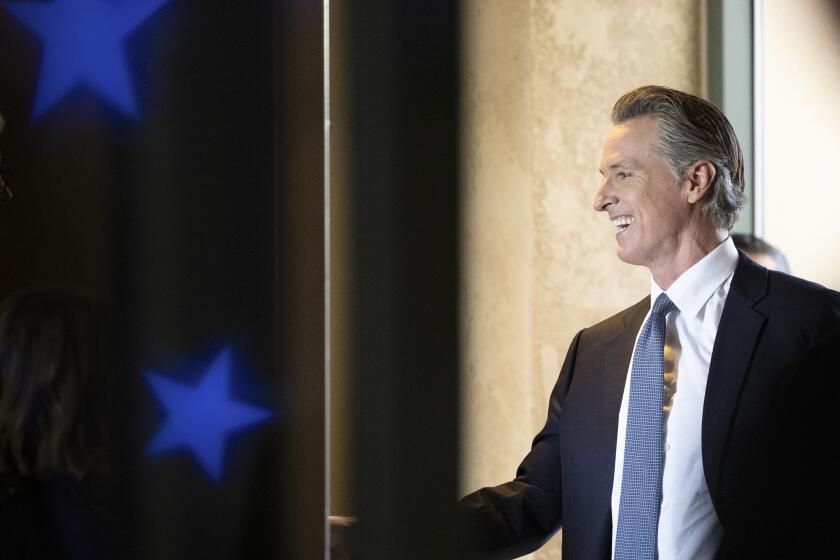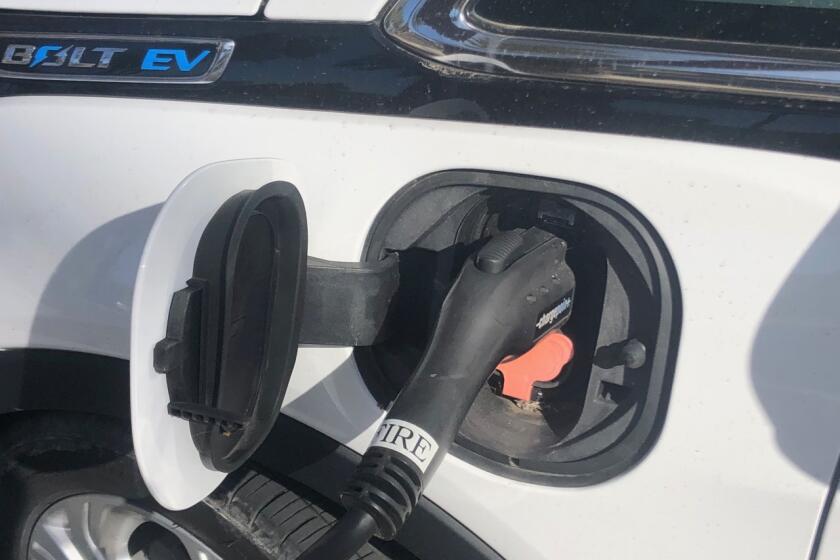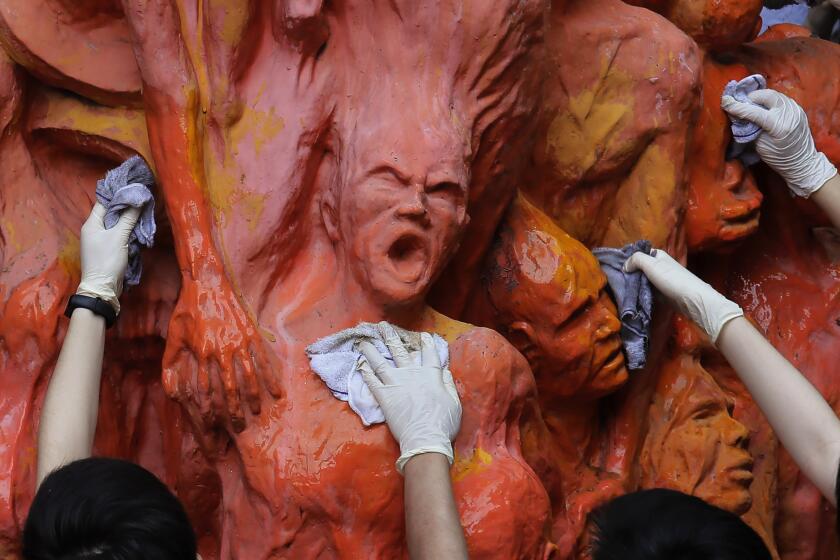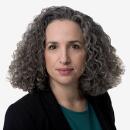After Israel visit, Newsom heads to China for climate talks. But can he avoid global conflicts?
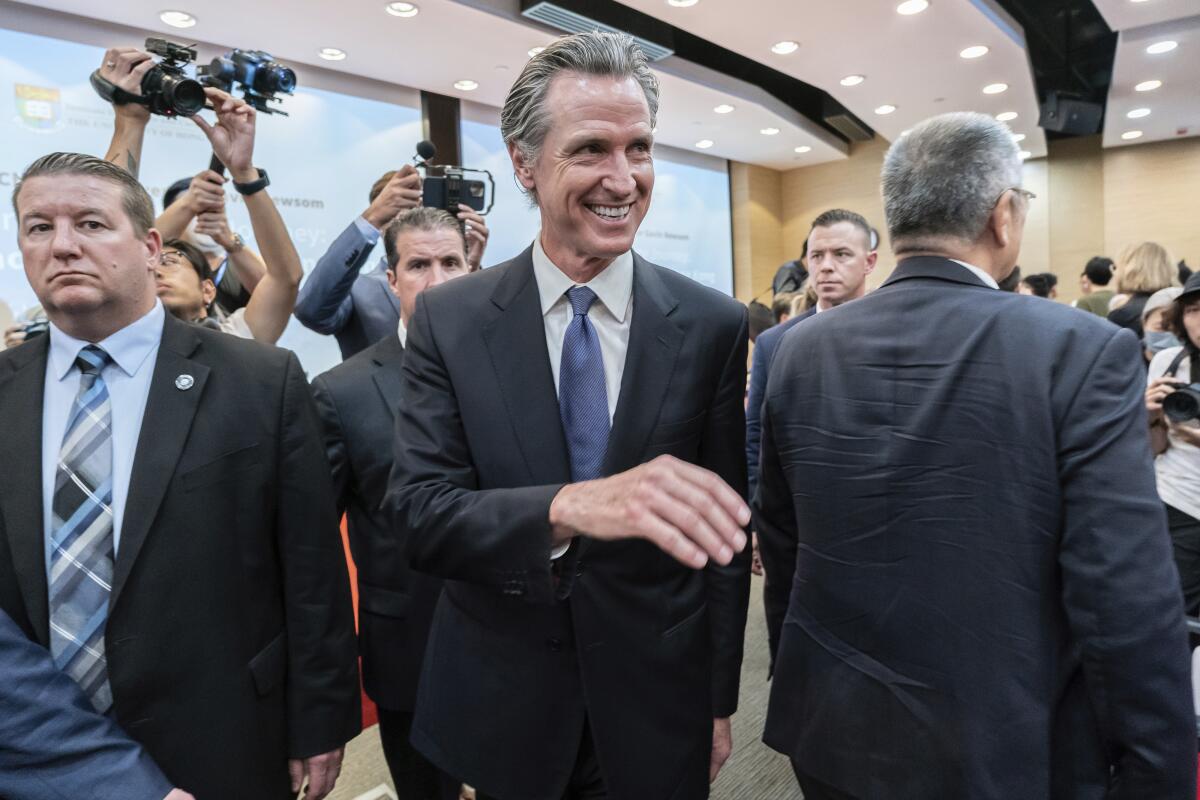
HONG KONG — Gov. Gavin Newsom comforted a mother whose son was kidnapped by Hamas, and visited a hospital where Israelis were recovering from injuries from the Oct. 7 attacks. He met with top Israeli officials, including Prime Minister Benjamin Netanyahu, and saw videos of beheadings.
That was how Newsom described his one-day visit to Israel before arriving in Hong Kong to kick off a weeklong trip through China focused on climate change.
“We went to show solidarity and support, to gain a deeper understanding and ultimately, to meet with these families, particularly connected to California, and notably the hostages, to see what we can do,” Newsom said during a brief conversation with reporters Monday in Hong Kong.
The voyage marks a sudden leap into foreign affairs for the Democratic governor who insists he is not angling to run for president. It comes at an especially fraught time, with Israel and Hamas engaged in a war that appears poised to escalate and U.S.-China relations growing increasingly tense. While the international exposure could help burnish Newsom’s resume if he ever does run for president, he also faces political risks by stepping into global conflicts that are outside a governor’s authority.
On Israel, Newsom has largely followed President Biden’s strong pro-Israel stance, visiting Tel Aviv days after Biden’s visit and echoing his outrage at the Hamas attacks that killed about 1,400 Israelis, took about 200 Israeli civilians hostage and prompted Israel’s retaliatory airstrikes that have pummeled the Gaza Strip for two weeks. The bombardment has killed more than 5,000 Palestinians, according the Hamas-led Health Authority in Gaza.
Though polls show Americans broadly support Israel in the war with Hamas, opinion is more divided among several Democratic constituencies, including young voters, progressives and people of color. Newsom did not attempt to visit Gaza on his brief trip to Israel, citing the logistical challenges involved. He said California is sending medical aid to Gaza to help establish field hospitals, including wheelchairs, IVs, defibrillators and 50 beds.
“We are working with an aid organization to get that into Gaza, separately and above from the aid we are providing for Israel,” Newsom said.
Asked if he called for a cease-fire during his meetings with Israeli authorities, Newsom demurred, saying, “I have a limited scope.”
Newsom is expected to meet with top officials on the topics of clean energy, air pollution and the transition to electric vehicles, among other topics.
In China, Newsom aims to keep his visit focused on areas where California and China can cooperate to fight climate change. His itinerary is filled with events meant to promote electric vehicles, offshore wind energy and other clean technologies. He’s scheduled to sign five compacts with regional governments, tour manufacturing sites and visit a wetlands preserve. In fostering climate-friendly partnerships with local officials, Newsom hopes to steer clear of a slew of international flashpoints.
That could prove difficult.
Tensions between the U.S. and China that have been rising for years may be further strained by the Israel-Hamas war. China and Russia announced last week that they intend to work together on creating an alliance that could attempt to counter U.S. support for Israel. While the U.S. and Europe consider Hamas a terrorist group, Beijing describes it as a “resistance movement.”
“China and Russia have the same position on the Palestine question, and China is ready to maintain communication and coordination with Russia to promote de-escalation of the situation,” China’s special envoy to the Middle East said on Friday, the Associated Press reported.
Meanwhile, a new report from the Pentagon says China is building up its nuclear weapons arsenal at a faster pace than previously projected and is likely studying Russia’s war in Ukraine to get a sense of how a conflict over self-governing Taiwan, which China claims as part of its territory, could play out.
“China is… very belligerent, aggressive, expansive and cannot be ignored. And Gavin Newsom has to be mindful,” said Orville Schell, director of the Center on U.S.-China Relations at the Asia Society.
“I think it’s actually a good thing for a governor to try to keep some doors open to China. But you cannot go in just naively believing that you’re going to ignore which way the wind is blowing on global politics.”
The geopolitical tensions are also playing out in California, where an Orange County family is asking Newsom and the U.S. government to help free David Lin, a Christian pastor held since 2006 whom the U.S. State Department considers wrongfully detained by China following his work for Christian churches.
Lin’s daughter, Alice, said she hopes Newsom and other American officials will discuss the plight of wrongfully detained Americans. She urged the governor to raise the issue of her father’s imprisonment as well as that of Kai Li, a Long Island resident sentenced to 10 years in prison on espionage charges, and Mark Swidan, a Texas businessman detained for over a decade.
“Any officials who are meeting with Chinese counterparts should raise the names of our loved ones at every opportunity,” Alice Lin said in an interview with The Times.
She said her father is a man of “incredible faith” and doesn’t like to talk much about his health with his family during the brief phone calls they’re allowed. But she knows he’s getting frail. She said he’s lost six teeth recently, which she pins on malnutrition.
“The last time we saw him, he was already very, very thin,” she said.
That was roughly 13 years ago. She said when her father was first imprisoned, she and her brother would take turns visiting him every year. But after flying to Beijing in 2010, she said her visit was arbitrarily canceled. Nobody would tell her why.
She hasn’t seen him since.
Rep. Katie Porter (D-Irvine) has been working to secure Lin’s release, said her spokesperson Peter Opitz. The congresswoman “supports Gov. Newsom doing what he can to bring David home to his family,” Opitz said.
Human rights activists are concerned that California’s work to collaborate with China on environmental issues brushes aside China’s human rights abuses of the Uyghur people in Xinjiang, a region rich in lithium and other minerals essential to developing batteries for electric vehicles. A United Nations report says China’s treatment of Uyghurs “may constitute international crimes, in particular crimes against humanity” and the United States has banned imports from the Xinjiang region due to concerns of forced labor.
Yet a Washington Post investigation last month found that Tesla is among many electric vehicle makers that have suppliers with connections in Xinjiang. Newsom is scheduled to visit a massive Tesla factory in Shanghai later this week.
A lithium producer for carmakers including BMW and Tesla Inc. is beginning work to assess battery metals projects in Xinjiang, deepening links between electric vehicle supply chains and a region at the heart of human-rights allegations against China.
Maya Wang, Asia associate director of Human Rights Watch, criticized Newsom’s plans to focus on environmental issues in China while leaving thorny human rights issues to federal authorities.
“This framing that it’s either climate or human rights is dangerous, counterproductive, and also inconsistent with his own policies in California,” Wang said in an interview with The Times.
“It’s disappointing, and we expect better and we hope to see better.”
Newsom’s trip is paid for by the California State Protocol Foundation, which is supported by donors. Public disclosures show that he has given more than $3 million to the protocol foundation from his inaugural committees since 2019.
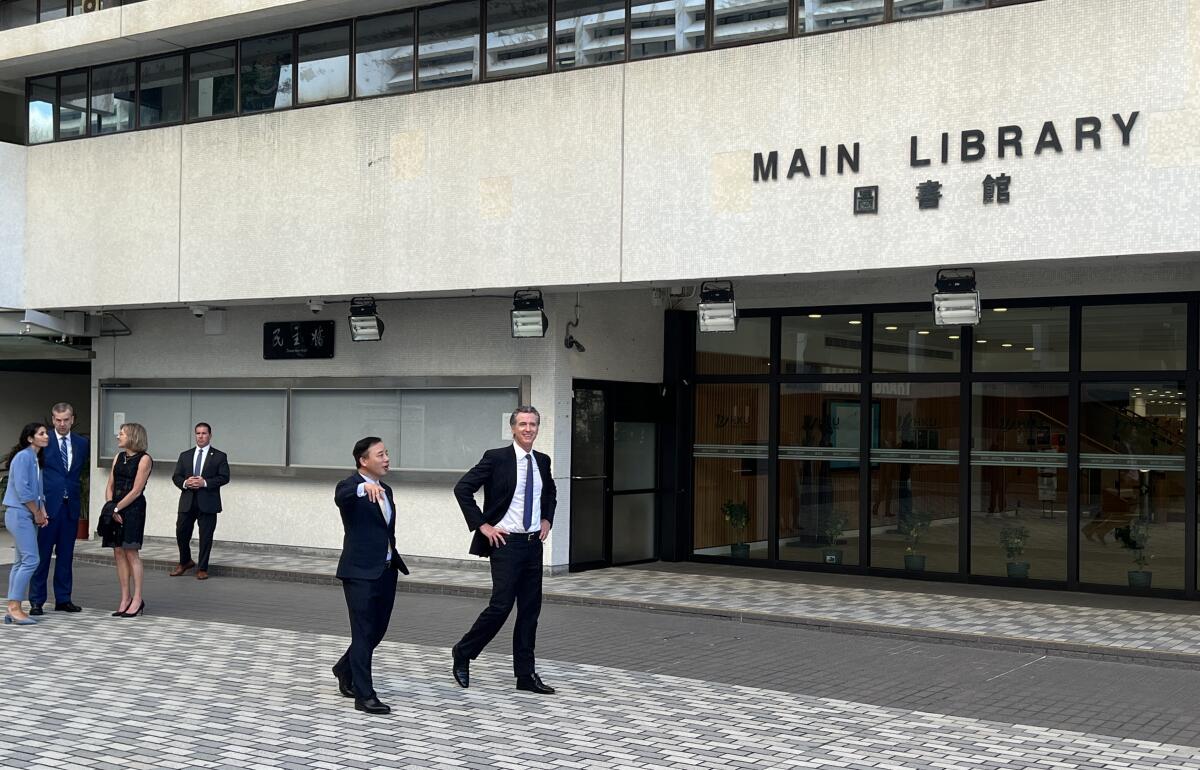
His first official meeting of the China trip was Monday at the University of Hong Kong, where he spoke to a lecture hall full of students and faculty about California’s work to fight climate change by transitioning to the use of clean energy.
“This is the greatest economic opportunity of our lifetime,” Newsom said.
As he walked through the campus, Newsom passed a sign hanging above a large empty bulletin board: “Democracy Wall” it said in English and Chinese. The board was once covered with students’ political posters, according to several media reports, but they were removed during the massive protests that swept Hong Kong in 2019 as China’s communist government clamped down on pro-democracy activists.
The dismantling of the ‘Pillar of Shame’ sculpture at the University of Hong Kong comes a day after landslide election wins by pro-Beijing candidates.
The university has faced criticism for working to squelch dissenting views by students engaged in activism against China. The massive pro-democracy demonstrations eventually ended with the exile or arrest of more than 100 activists, the shuttering of independent media outlets, and the dissolution of pro-democracy labor unions.
Newsom did not mention Hong Kong’s democracy movement during his public remarks at the university. His aides said the campus was chosen as the governor’s first stop because it is a premier research university akin to UC Berkeley.
The uprising in Hong Kong marks yet another big change from the last time a California governor visited China. Though Newsom is the third consecutive California governor to travel to China in search of climate-friendly partnerships with businesses and local governments, the U.S. relationship with China is “radically different” now compared with when former Gov. Jerry Brown visited in 2013 and 2017, said Schell of the Asia Society.
China has a tendency to use “well-meaning earnest interactions” by American officials to advance its own agenda, Schell said, which could be damaging to Newsom.
“Gov. Newsom is going to have to be extremely careful that what he does in the world of climate change, energy and these kinds of actually very constructive places where we do need to interact with China, don’t run at cross purposes with Washington,” Schell said.
“I think he can do this and he’s really smart and able, but I think it’s going to be a slalom course.”
Times staff writer Rebecca Ellis and the Associated Press contributed to this report.
More to Read
Sign up for Essential California
The most important California stories and recommendations in your inbox every morning.
You may occasionally receive promotional content from the Los Angeles Times.
